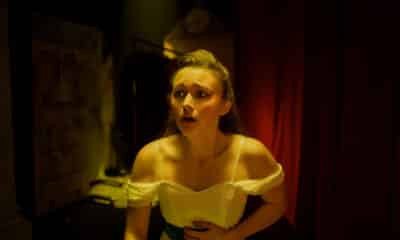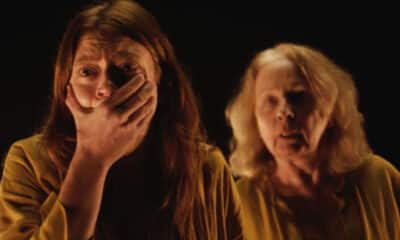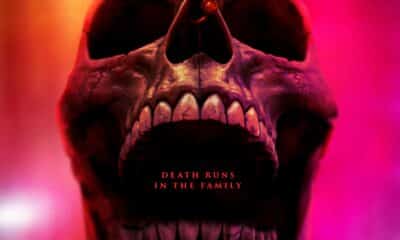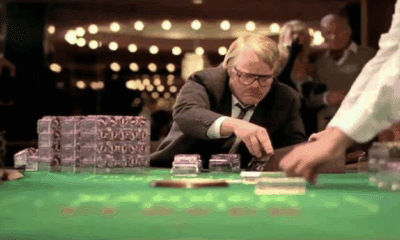 The Man Who Saved The World is an acclaimed drama documentary, out to buy now. Telling an astonishing true story, it follows retired Russian Colonel Stanislav Petrov, who appears as himself alongside such notable names as Robert De Niro, Kevin Costner and Matt Damon.
The Man Who Saved The World is an acclaimed drama documentary, out to buy now. Telling an astonishing true story, it follows retired Russian Colonel Stanislav Petrov, who appears as himself alongside such notable names as Robert De Niro, Kevin Costner and Matt Damon.
Blending reality and narrative filmmaking to intriguing effect was Dutch director Peter Anthony (pictured above). We caught up with him to gain a fascinating insight into a timely meditation on the thin line between war and peace.
 I found the film very interesting, in that rather than being a straightforward documentary it’s more a drama with documentary elements. What led you to make the film like that, and to cast Mr Petrov as an actor?
I found the film very interesting, in that rather than being a straightforward documentary it’s more a drama with documentary elements. What led you to make the film like that, and to cast Mr Petrov as an actor?
Peter Anthony: It wasn’t intentional. First I wanted to make it more of a documentary, follow the character around. What happened was… I remember the first time I sat down with Stanislav. And we were having a discussion off-camera, and I tried to get into his personal story and he said: ‘Peter. I’m never going to get into my personal story. I’m a Russian Colonel, we don’t talk about that.’ I was like ‘Shit, this is going to be difficult!’ (Laughter)
And the second thing was that… you know, I started off-camera to talk about stuff. Because what I’d read in the news, they’d made so many mistakes, you know like a bunker underground, all kinds of weird stuff. So I tried to get into that, and what he would do is he would start telling me how dangerous it really was. It was horrifying. And then suddenly we’d put the camera on and he would lie to us. He would say ‘Oh it wasn’t that bad… you know, it was a little mistake but it wasn’t Russia’s fault.’ And I found that he was really, really scared about talking about details, about the night. I think it’s simply because of the way he was brought up, in the Russian system, where you were so afraid to tell about military secrets… they were still hanging onto him. He came under so much pressure… and I felt ‘Let’s try to do that. Let’s try to break him.’ I know it’s very evil and you’re not supposed to do that, but we just put a lot of pressure on him in the end, asking the same question again and again… and then suddenly he would just forget about the facade and start yelling, and talking about what he was mad about and stuff like that. And I knew when he started doing that, that it wasn’t a normal documentary, and we just went full line. It was more important that the story was true than the format.
Once you decided how you were going to approach the subject, how did the shoot evolve?
It evolved as soon as we started working on it… It was very difficult because I really wanted to this film to have a broader audience, with lots of younger people. It was very important for me. Because I’m forty-four years old, I know all about the Cold War, I was so afraid at the time. And my kid, who’s eighteen years old, he knows nothing about it. People think kids don’t care about politics today and about nuclear war or whatever. And I found out it’s a bullshit lie! It’s just because they don’t know about it. So we tried to make it a little bit more entertaining…
First we made the film with Stanislav, just edited the whole film. And then afterwards we started writing what happened down in the bunker, and with his wife. Then we started cutting it together. We just had to do it like that.
 The film’s key scene is set in the control room of the Soviet nuclear strike command. How did you go about recreating that environment?
The film’s key scene is set in the control room of the Soviet nuclear strike command. How did you go about recreating that environment?
First of all I was kind of an architect, I trained from ‘92 – ‘99. The place doesn’t exist any longer, it burned down. They had to rebuild it. We were never going to be allowed to film in there anyway! (Laughs) So I was sitting there with Stanislav, and we recreated the whole thing. And then we brought Stanislav to the set, and he got so emotional. We were standing there in the control room. I remember he said, like… he’s so Russian… He told me: ‘It’s a little prettier than it used to be!’ (Laughs) He got a little tear in his eye. But he really felt it was very, very close.
You showed the American reaction to Mr Petrov. What reaction have you received from the Russian government?
I remember at the UN, when Stanislav got an award there, the Russian government… I talked to them afterwards… and what they would do, in a very Russian style, they would say, like: ‘But Americans also had their mistakes!’ Trying to put it the other way around. The best reaction I’ve had… two strong reactions that I thought were very strong… Sergey Shnyryov, the Russian actor who’s playing Stanislav as a younger man, was very emotional and told me he was a little bit ashamed that a Russian director didn’t do the movie. That it had to be somebody from our part of the world. I had the same feeling when we were doing the score in Czechoslovakia. We had two hundred people playing the violin… they were playing while they’d see the picture, so they found out what the story was about. One woman started crying, and she wanted me to go up and tell them the story. And they had the same feeling, like ‘Why didn’t we do it?’ So I think a lot of Russian people really, really want the movie.
 Tell me how you approached Kevin Costner. His reaction is quite memorable in that he’s humbled by Mr Petrov but also quite baffled by the experience because Stanislav reveres him so much.
Tell me how you approached Kevin Costner. His reaction is quite memorable in that he’s humbled by Mr Petrov but also quite baffled by the experience because Stanislav reveres him so much.
Yeah, exactly. What happened was a really bad coincidence. The first time I met Stanislav we were supposed to be there for one week and then we stayed for three. I tried to get an approach of how to make the film better. Suddenly, when we had to leave, I look out and there are all these Russian skinheads roaming around our car, and our driver’s really getting scared. He says: ‘We have to go now.’ And then Petrov comes in with a big plastic bag filled with letters, fan letters. There’s like a twelve year old girl, Diane from Oklahoma, saying ‘I chipped in five dollars, because I wouldn’t be alive if you hadn’t saved my parents lives in 1983.’ Really heartbreaking. And he couldn’t write her back because it was all in English and he doesn’t actually speak English.
Then suddenly I see this cheque, like six hundred dollars. It says ‘K Costner’, I think it’s Columbia Pictures. And I’m like ‘Wow, who the hell is this?’ And he’s like ‘Oh, Kevin Costner just wrote me.’ And I’m like ‘Why the hell didn’t you tell me?’ and he’s like ‘You never asked me!’ (Laughter) And then suddenly I found out that Kevin Costner was one of his big heroes. He really loved that film he did called Thirteen Days, about the Cuban Missile Crisis. And also of course Dance With Wolves! I said to Stanislav: ‘Why didn’t you try and make contact with him?’ and he said he wanted to write a letter and send him a book, but he didn’t know how to translate it into English. So I helped him translate the letter. That’s how it all started.
What was Mr Petrov’s reaction to the finished film?
He hasn’t seen it yet. He was supposed to see it in Vienna, we were going to shoot a meeting with all the different countries of the world, discussing world peace and nuclear weapons. And he got sick that day, he couldn’t go. So what we were planning was he had to see it with a big audience…
Hopefully that’ll go well!
(Laughter) I hope so! He’s seen a lot of takes from the film, so he’s seen a big part of the film. But for me it was very important that he sit down and see the film with an audience around him, because I really believe that whenever people see the film, they love him in the end. I’m just afraid if he sits there by himself and he sees yelling and swearing or whatever, that’s not so good.
What one thing would you like audiences to take away from the film?
First of all I know it’s very naive… when I cut the film for the first time I was like: ‘Shit man, are we really gonna tell them we have to forget about the past and think about the future? And reach our hand out to our enemies?’ But as soon as we made the film it made sense! I really believe so. I can tell you when we were in the States, showing it to Republicans and Democrats… afterwards everybody thought Stanislav was a hero. They didn’t care about whether he was Russian. And everybody was against nuclear weapons suddenly. Isn’t that amazing? We had the same experience with a big Christian group in the US, who want to support the film now, because they’re so fed up with nuclear weapons. They never thought they should be man-made. The other group that want to support it is a Muslim group. I think that’s amazing.
I think it has a message and that all the young people will go and see the film right now. In Denmark we already had twenty thousand pre-sold tickets to the theatres for this film, and it’s mainly young people. I was told if I made a film about an old Russian Colonel I’d only get plus-45 men who’d watch it on the BBC. That young people wouldn’t care about this stuff, and it’s such a lie. Somehow the story of the Cold War got lost.
The Man Who Saved The World is out now on DVD, Blu-ray & to download. Read our review here.
Steve is a journalist and comedian who enjoys American movies of the 70s, Amicus horror compendiums, Doctor Who, Twin Peaks, Naomi Watts and sitting down. His short fiction has been published as part of the Iris Wildthyme range from Obverse Books.

Latest Posts
-


Film Reviews
/ 11 hours ago‘Fear Street: Prom Queen’ review: Dir. Matt Palmer (2025)
It has been four years since Leigh Janiak’s Fear Street trilogy took horror fans...
By Kat Hughes -


Film Reviews
/ 12 hours ago‘The Surrender’ review: Dir. Julia Max (2025)
As Julia Max’s debut feature, The Surrender, unfolds, the inspirations for the film become...
By Kat Hughes -


Film Trailers
/ 2 days agoFirst trailer for Darren Aronofsky’s ‘Caught Stealing’
Sony Pictures has released the debut trailer for Darren Aronofsky’s new film Caught Stealing,...
By Paul Heath -


Film Reviews
/ 3 days ago‘Lilo and Stitch’ review: Dir. Dean Fleischer Camp (2025)
Director Dean Fleischer Camp won audiences over with the fantastic Marcel the Shell with...
By Kat Hughes





